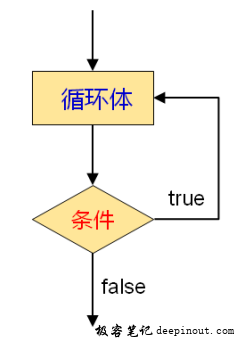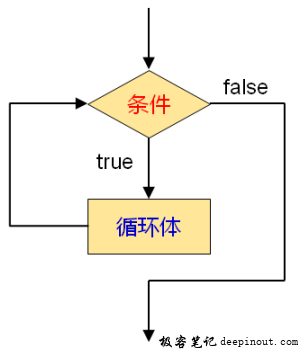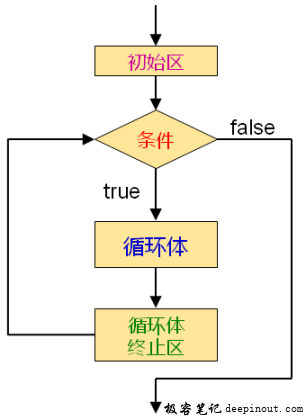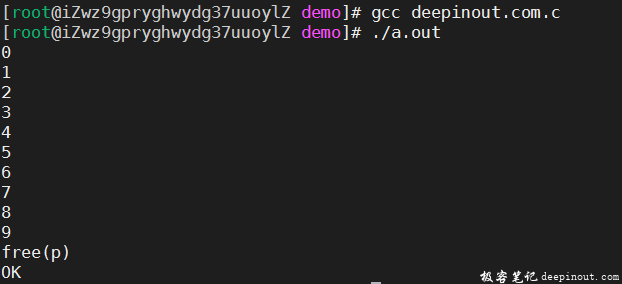C语言 循环语句
C语言循环语句分为for循环和while循环语句,本文介绍这两种循环语句。
循环语句的基本工作方式:
- 通过条件表达式判断是否执行循环体
- 条件表达式遵循if语句表达式原则
do, while, for的区别:
- do语句先执行后判断,循环体至少执行一次
- while语句先判断后执行,循环体可能不执行
- for语句先判断后执行,相比while更简洁
while循环
while循环我们从do...while语句和while语句来讲解。
do...while语句
do...while语句的循环方式如下

示例
do {
//code
} while (condition);
while语句
while语句的循环方式为

示例:
while(condition) {
//code
}
for循环
for 语句的循环方式

示例
for(i=0;condition;i++) {
//code
}
三种循环语句对比示例
#include <stdio.h>
int f1(int n)
{
int ret = 0;
if( n > 0 )
{
do
{
ret += n;
n--;
}
while( n > 0 );
}
return ret;
}
int f2(int n)
{
int ret = 0;
while( n > 0 )
{
ret += n;
n--;
}
return ret;
}
int f3(int n)
{
int ret = 0;
int i = 0;
for(i=1; i<=n; i++)
{
ret += i;
}
return ret;
}
int main()
{
printf("%d\n", f1(100));
printf("%d\n", f2(100));
printf("%d\n", f3(100));
return 0;
}
运行结果:

循环中断
break和continue可以用于中断或终止循环,两者的区别是
- break表示终止循环的执行
- continue表示终止本次循环,进入下一次循环执行
- switch能否用continue关键字?为什么?
- 不能,因为switch是分支语句,没有循环的概念。而continue是中止本次循环,进入下次循环,只能为循环语句所用,不能用在其他场合。
continue和break的区别示例
#include <stdio.h>
void f1(int n)
{
int i = 0;
for(i=1; i<=n; i++)
{
if( (i % 2) == 0 )
{
break;
}
printf("%d ", i);
}
printf("\n");
}
void f2(int n)
{
int i = 0;
for(i=1; i<=n; i++)
{
if( (i % 2) == 0 )
{
continue;
}
printf("%d ", i);
}
printf("\n");
}
int main()
{
f1(10);
f2(10);
return 0;
}
运行结果:

do和break的妙用示例
可以做到goto语句的效果。
#include <stdio.h>
#include <malloc.h>
int func(int n)
{
int i = 0;
int ret = 0;
int* p = (int*)malloc(sizeof(int) * n);
do
{
if( NULL == p ) break;
if( n < 5 ) break;
if( n > 100) break;
for(i=0; i<n; i++)
{
p[i] = i;
printf("%d\n", p[i]);
}
ret = 1;
}while( 0 );
printf("free(p)\n");
free(p);
return ret;
}
int main()
{
if( func(10) )
{
printf("OK\n");
}
else
{
printf("ERROR\n");
}
return 0;
}
运行结果:

总结
- for循环先进行判断再进入循环体
- for循环适合于循环次数固定的场景
- while循环先进行判断再进入循环体
- while循环适用于循环次数不固定的场景
- do…while循环先执行循环体在进行判断
- do…while循环至少执行一次循环体
本文链接:http://so.lmcjl.com/news/23725/
展开阅读全文
上一篇:2021年私人民屋买卖合同格式模板五篇
下一篇:2021通用版民屋买卖合同样本
相关内容